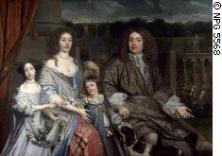See also
- Robert VYNER's father: William VYNER ( - )
Sir Robert VYNER Baronet (1631-1688)
1. Sir Robert VYNER Baronet, son of William VYNER ( - ), was born in [Julian] 1631. He had the title 'Lord Mayor of London'. He was a Banker, Lord Mayor of London. He died in [Julian] 1688 in Windsor Castle.
Robert Vyner, born in Warwickshire in 1631, rose rapidly to a position of great power and influence under the tutelage and patronage of his uncle Sir Thomas Vyner (see article on Sir Thomas). In 1661, at the age of thirty, he became the King's Goldsmith (Charles II). He was knighted in 1665, and in the following year became an Alderman of the City of London and Sheriff of London, which position he held at the time of the Great Fire of 1666. The King attended the Mayoral Banquet at which Sir Robert was confirmed as Lord Mayor of London in 1674. Sir Robert also became a baronet at this time.
It is a snapshot of the power and status enjoyed by Sir Robert Vyner that "in 1675, three hundred and fifty richly-habited archers marched through the city to compliment Sir Robert Vyner, the Lord Mayor, who entertained them at dinner".
Sir Robert Vyner at one time or another owned Sutton House (in Hackney), Swakeley House (in Ickenham, Middlesex) and the house that is now the post-office on the south side of Lombard Street.
He won and lost vast sums of money: when the goldsmiths, at a time of great difficulty already alluded to, all but abandoned the practice of making and selling plate, they took to running full-time banking houses, using the promissory notes which were the forerunner of our first bank notes. From this Sir Robert and other goldsmiths made an immense fortune. At one time he "bought the crown jewels of Charles II and furnished £300,000 to the Restoration Navy. And yet, earlier in his career, before his success as a banker, he was owed £400,000 by the national exchequer, and, when the it suspended payment in 1672, Robert had to deal with his creditors!
In about 1670, Sir Robert set up an equestrian statue of Charles II at Stocks Market, the site of the present Mansion House, this to complement another , at Charing Cross, of Charles II's father Charles I: the poet Andrew Marvell was somewhat sceptical of Sir Robert's motives and of both Stuart monarchs -
"That he should be styled Defender of the Faith
Who believes not a word what the Word of God Saith"
and:
"Though he changed his religion, I hope he's so civil,
Not to think his own father is gone to the devil!"
... he says of Charles I; and, when the Stocks Market horse launched out at Charles I for having fought so desperately for the "surplice, lawn sleeves, the cross and the mitre", the Charing Cross horse retorted with a sneer:
"Thy king will ne'er fight unless for his queens".
Whether Sir Robert himself was aware of his own ambivalent position of his family having first risen to its position through Oliver Cromwell and the Protectorate, and having fared so badly under the James and Charles I, now flattering and sidling up to the later Stuart monarchs, is not known. But then, politics has always been about expediency!
